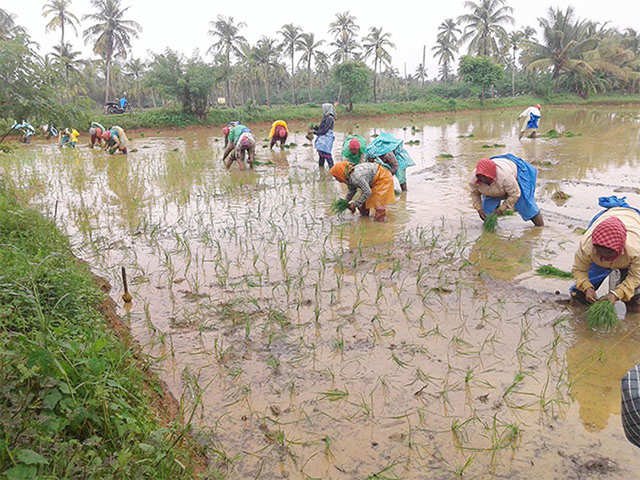Farm wages doubled in many agricultural districts as migrants labourers returned home
Farmers are trying to lure migrants back by offering them rail tickets and other incentives. Many farmers in Punjab, Haryana, West Bengal, Telangana and Andhra Pradesh are trying to mobilise local labourers to prepare nursery beds and sow paddy, which is a very labour-intensive task.
by Madhvi Sally, Sutanuka Ghosal
New Delhi | Kolkata: Farm wages have doubled in many agricultural districts as farmers depend heavily on migrant labourers who have returned home.
Farmers are trying to lure migrants back by offering them rail tickets and other incentives. Many farmers in Punjab, Haryana, West Bengal, Telangana and Andhra Pradesh are trying to mobilise local labourers to prepare nursery beds and sow paddy, which is a very labour-intensive task.
“Labour cost for paddy planting has doubled to Rs 6,000 per acre in Punjab and Haryana,” said Bhupinder Singh Mann, national president of Bhartiya Kisan Union. “Costs can go up further if the labour shortage remains. Paddy transplantation is an intensive process that will require 5-6 lakh labourers in each state over and above the domestic supply.”
Labour cost in India’s top rice producer West Bengal has gone up by 50%. “Supply of labour is a major issue now as there is also a fear of spreading coronavirus. Also, instruments used in sowing are not readily available because factories which manufacture them are not working at full capacity,” said Suraj Agarwal, CEO of Tirupati Agri Trade. The state annually produces 15 million tonnes of rice, which is more than 15% of country’s total rice production.
BV Krishna Rao, president of Rice Exporters Association, said non-basmati rice exporters were ready to pay for transporting farm labourer to Andhra Pradesh, Telengana, Tamil Nadu and Kerala. “We will require farm labourers to do transplanting of seeds from nurseries to fields in July,” he said.
Labour shortage is likely to continue as workers will return only after finishing planting in their own fields and if they are given good incentives, said Chinmay Tumbe, economist and assistant professor at IIM Ahmedabad . "With the trust between contractors and labourers broken, a good compensation and interstate co-ordination by state governments will help in resolving the situation. Also, states and farmers will have to provide some social security measure especially in health for labourers to come back.”
Ganpar Nagendra, a paddy farmer from Telangana, said local labourers were also demanding higher wages. “We are negotiating with them. But if they don’t listen to our request, we will have to settle for higher rates.”
Paddy is the most important kharif crop in India. Sowing begins in June and stretches till July depending upon the arrival of the monsoon. Paddy crop requires planting and replanting unlike any other crops. First, the nursery beds are prepared where the saplings are grown. Subsequently, the saplings are taken out from the nursery beds and replanted in the fields. This makes it very labour intensive.